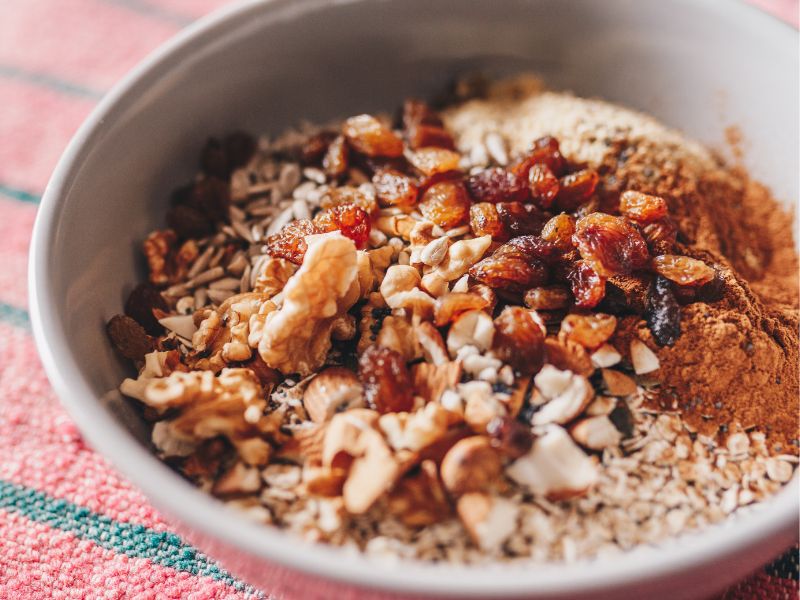Reviewed by Dr. Judith Thompson, ACHS Dean of Aromatherapy
Celebrating Herb Day 2025
Herb Day is an annual celebration dedicated to the knowledge, benefits, and traditions of herbs. Taking place on May 3, 2025, this event encourages people worldwide to explore the power of herbal medicine, gardening, and holistic wellness. In honor of Herb Day, we’ve compiled a list of ten essential herbs to help you build your very own well-rounded home apothecary!
A well-stocked home apothecary is a wonderful entryway into the realm of holistic health and wellness. These ten commonly used herbs are key to building the foundation of your home remedy toolkit.
1. Chamomile Matricaria recutita
 Chamomile is well-known for its calming effects, making it a great choice for supporting stress and healthy sleep. It also helps maintain a healthy digestive system and can support the prevention of inflammation. In recognition of its remarkable benefits, chamomile has been named the 2025 Herb of the Year™ by the International Herb Association.
Chamomile is well-known for its calming effects, making it a great choice for supporting stress and healthy sleep. It also helps maintain a healthy digestive system and can support the prevention of inflammation. In recognition of its remarkable benefits, chamomile has been named the 2025 Herb of the Year™ by the International Herb Association.
How to Use: Drink as a tea before bed, apply as a compress for skin irritation, or add to a bath for relaxation.
2. Peppermint Mentha x piperita
 A must-have for digestive health, peppermint can soothe an upset stomach and support headaches. Its cooling properties make it an excellent choice for maintaining healthy muscles, and sinuses, and even as a natural bug deterrent.
A must-have for digestive health, peppermint can soothe an upset stomach and support headaches. Its cooling properties make it an excellent choice for maintaining healthy muscles, and sinuses, and even as a natural bug deterrent.
How to Use: Brew into a tea, inhale the essential oil when congested, or apply diluted essential oil to temples for tension headaches.
3. Lavender Lavandula angustifolia
 Lavender is a powerhouse for relaxation and skin health. It is remarkably versatile because of its gentle yet powerful therapeutic properties. It helps maintain a clean, balanced environment and exudes a pleasant floral aroma, often used in soaps and perfumes.
Lavender is a powerhouse for relaxation and skin health. It is remarkably versatile because of its gentle yet powerful therapeutic properties. It helps maintain a clean, balanced environment and exudes a pleasant floral aroma, often used in soaps and perfumes.
How to Use: Use in aromatherapy, add dried flowers to tea, or apply diluted essential oil to the skin for soothing effects.
4. Echinacea Echinacea angustifolia
 Known primarily for supporting immunity, echinacea is frequently used for seasonal wellness. This vibrant purple flower is rich in antioxidants and bioactive compounds, easily taken as a tea, tincture, or supplement.
Known primarily for supporting immunity, echinacea is frequently used for seasonal wellness. This vibrant purple flower is rich in antioxidants and bioactive compounds, easily taken as a tea, tincture, or supplement.
How to Use: Brew into a tea or tincture at the first sign of illness for immune support.
5. Ginger Zingiber officinale
 Ginger, known for its warming properties, supports digestion and nausea and helps maintain healthy circulation. It is a go-to herb for an upset stomach or cold hands and feet. Its versatility makes it an essential staple for holistic wellness.
Ginger, known for its warming properties, supports digestion and nausea and helps maintain healthy circulation. It is a go-to herb for an upset stomach or cold hands and feet. Its versatility makes it an essential staple for holistic wellness.
How to Use: Make a warming tea, add to meals for digestive support, or use it as a compress for muscle aches.
6. Turmeric Curcuma longa
 Known for its vibrant golden hue and active compound curcumin, turmeric is celebrated for its supportive anti-inflammatory and antioxidant properties. Traditionally used in Ayurvedic and Traditional Chinese Medicine, it supports joint health and overall wellness.
Known for its vibrant golden hue and active compound curcumin, turmeric is celebrated for its supportive anti-inflammatory and antioxidant properties. Traditionally used in Ayurvedic and Traditional Chinese Medicine, it supports joint health and overall wellness.
How to Use: Mix with black pepper in golden milk, add to meals, or take as a tincture.
7. Lemon Balm Melissa officinalis
 Lemon Balm is a gentle herb that is great for stress support and maintaining healthy digestion. It has a slightly citrusy flavor with woody and earthy notes blending well in many teas and infusions. It is ideal for sleep support and can also help maintain a calm and balanced mood.
Lemon Balm is a gentle herb that is great for stress support and maintaining healthy digestion. It has a slightly citrusy flavor with woody and earthy notes blending well in many teas and infusions. It is ideal for sleep support and can also help maintain a calm and balanced mood.
How to Use: Enjoy as a tea, add to a relaxing bath, or use in tinctures for mood support.
8. Calendula Calendula officinalis
 A fantastic herb for skin health, calendula is known for its antimicrobial and anti-inflammatory properties. It is often referred to as the “herb of the sun,” and its gentle yet powerful nature can support the skin and digestive health.
A fantastic herb for skin health, calendula is known for its antimicrobial and anti-inflammatory properties. It is often referred to as the “herb of the sun,” and its gentle yet powerful nature can support the skin and digestive health.
How to Use: Make into an infused oil, use as a salve, or brew into tea for internal support.
9. Thyme Thymus vulgaris
 Thyme is rich in antioxidants and supports respiratory health and healthy immune function. It is a valuable tool for maintaining seasonal wellness. Thyme is also believed to have calming effects, offering stress support. It is also used in skincare and as a bug deterrent.
Thyme is rich in antioxidants and supports respiratory health and healthy immune function. It is a valuable tool for maintaining seasonal wellness. Thyme is also believed to have calming effects, offering stress support. It is also used in skincare and as a bug deterrent.
How to Use: Make a tea for soothing your throat, use in steam inhalation for clear sinuses, or incorporate into cooking.
10. Basil Ocimum basilicum
 Basil is often used to support headaches and migraines naturally, making it an excellent tool for emotional balance. Its essential oil is often used in aromatherapy to promote clarity and relaxation. Additionally, basil naturally supports healthy respiratory function and can be used in topical applications to soothe muscles.
Basil is often used to support headaches and migraines naturally, making it an excellent tool for emotional balance. Its essential oil is often used in aromatherapy to promote clarity and relaxation. Additionally, basil naturally supports healthy respiratory function and can be used in topical applications to soothe muscles.
How to Use: Drink as a tea for daily wellness, use in tinctures, or add fresh leaves to meals.
Building Your Home Apothecary
Start small and gradually expand your herbal collection based on your health needs. Research the specific storing methods for each herb, as proper methods for maintaining potency may vary. Experiment with teas, tinctures, salves, and infused oils to discover the best ways these herbs can support your well-being. Have fun!
Interested in learning more about the history, uses, and science behind herbs? Explore ACHS’ accredited Herbal Medicine Programs.




